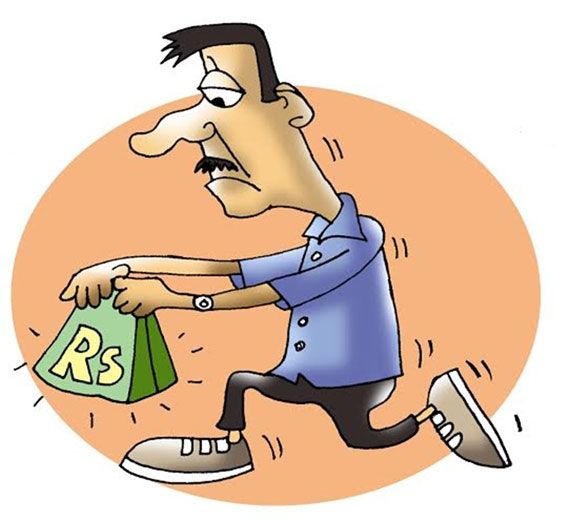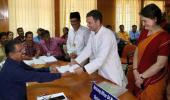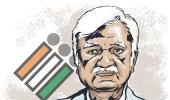'With the Election Commission wisening up to the practice, which strikes at the very root of electoral democracy, the practitioners of cash for votes have been getting more and more ingenious,' points out Saisuresh Sivaswamy.

Once again Tamil Nadu is in the news over the mind-boggling amounts of cash seized during election season.
In fact, the phenomenon is so commonplace in the state that it may make better sense to cancel the hustings, and let the political parties bid for the electorate, with whoever being able to make the highest bid per capita, for the whole of the state, to be allowed to form the government.
When you go to the state and talk to the people, you realise there is no sense of shame or outrage among either them, or the politicians, about the cash handout during elections.
It is our money which they have looted which they are giving back to us, is how the people justify it.
If we don't pay the other party will anyway pay them money, so let's pay them and retain their vote, is how the politicians justify it.
Even 'outsiders' who are airdropped into the state to fight elections end up perpetuating the practice. Like this high-profile leader whose campaign trail I was once part of, and who found currency notes being pressed into his reluctant hands to put into the aarti plates that everyone holds out in villages.
This is the easiest, and cheapest, way to distribute money. But here the amounts are small, only 10- and 20-rupee notes when I was there years ago. Now, perhaps, adjusted for inflation the amount may have gone up to 50 rupees.
With the Election Commission wisening up to the practice, which strikes at the very root of electoral democracy, the practitioners of cash for votes have been getting more and more ingenious.
Mobile recharges, paying for groceries, payout in another constituency, designating a points-man in each building and let him do the cash distribution... it all gets really hard to crack.
It's not that only the Opposition that is guilty of the practice although the selective tax raids that are being carried out may give one the impression that the other side is as infallible as the EVMs.
I have seen both the major parties, and their alliance partners too, spreading the love, and heard multiple stories about election-time largesse.
It was just this kind of black money in circulation that the painful demonetisation exercise of November 2016 was supposed to end. BJP chief Amit Anilchandra Shah was on TV the other night tom-toming its virtues, as have various ruling party bigwigs done at various times, but the proof of its failure stares us in the face.
BJP leader Subramanian Swamy, on CNN-News18 on Tuesday night, had no hesitation in calling the note ban a failure, but with a caveat. 'It was a good decision but badly implemented. The finance ministry did not make any arrangements,' he said, a little craftily as such qualification insulates him from any backlash from the party.
After all, he was not criticising the move, but only its implementation -- which incidentally was being handled by his bete noire, the finance minister.
But the discussion with Bhupendra Chaubey was not to look back at November 2016, but to discuss the cash seizures by the Election Commission flying squads as well as the tax raids on Opposition leaders (but not on either the ruling party or its allies).
The Congress's Abhishek Singhvi made a valid point -- not for nothing is he among the top-paid legal brains in the country -- that a 'non-level playing field was being created by the misuse of enforcement agencies during the Model Code of Conduct.'
Former chief election commissioner N Gopalaswami, perhaps the best qualified to speak on the menace, wondered if the Indian character -- or lack of it -- was to blame, 'I don't know,' he told Mirror Now's Faye D'Souza.
On a more serious note, he spoke of the difficulties in securing convictions in India, and the inordinate time the legal process took, and contrasted the same with the example of a finagling public servant in the US who was tried and convicted in 18 months' flat.
It is not the absence of laws, he said, but their enforcement and the time taken in their enforcement that allowed the political class to go scot-free.
'If a few hundred corrupt ministers and bureaucrats were convicted and sent to jail, people will sit up and take notice,' Gopalaswami said.
Talking of which, a report (external link) in The Tribune lends strength to what the former CEC had to say about the poor implementation of laws.
'The Central Vigilance Commission is awaiting sanction to prosecute 79 corrupt central government employees, including an IAS officer, for over four months from different oganisations,' the newspaper says in this report.
Perhaps predictably, both Republic TV and Times Now were on different tracks. The former's hashtag, DebatingCongMuslimVote, said it all, with the panelists shouting at each other and the anchor outshouting everyone.
Navika Kumar took objection to a panelist using the term 'top dog' which she found offensive, and proceeded to correct his English, of which she had 'some knowledge'. There is underdog, there is top gun, but there is no top dog, she ticked him off despite his protestations to the contrary.

Tailpiece
Ever wondered how political parties manage to get huge crowds at their election rallies? Rent-a-crowd managers, is the easy explanation, but even they don't come cheap.
Gone are the days when a meal packet was enough to bring crowds from their villages and towns; now, it is transport (mass transport, that is), meals, and cash. The amounts could vary from area to area, and depends on the number required to be mobilised.
If it is, say, the prime minister's rally, the amounts spent are higher; if it is just a junior rung leader, then naturally it costs less.
The crowd organisers pay the workers out of their own pockets, and get reimbursed by the political party -- often not in full, but the favours follow later and take care of any hurt sentiment.
Despite the formal economy that demonetisation is supposed to have ushered in, all payments are strictly in cash.
Which, if you think about it, also explains the huge amounts of money that surface across the country come election time.
Here's an interesting article (external link) that says specifically in India, it is biryani that fuels the ballot.
In my time in Tamil Nadu, it used to be curd rice and pickle. Guess we have indeed made some progress.











 © 2025
© 2025